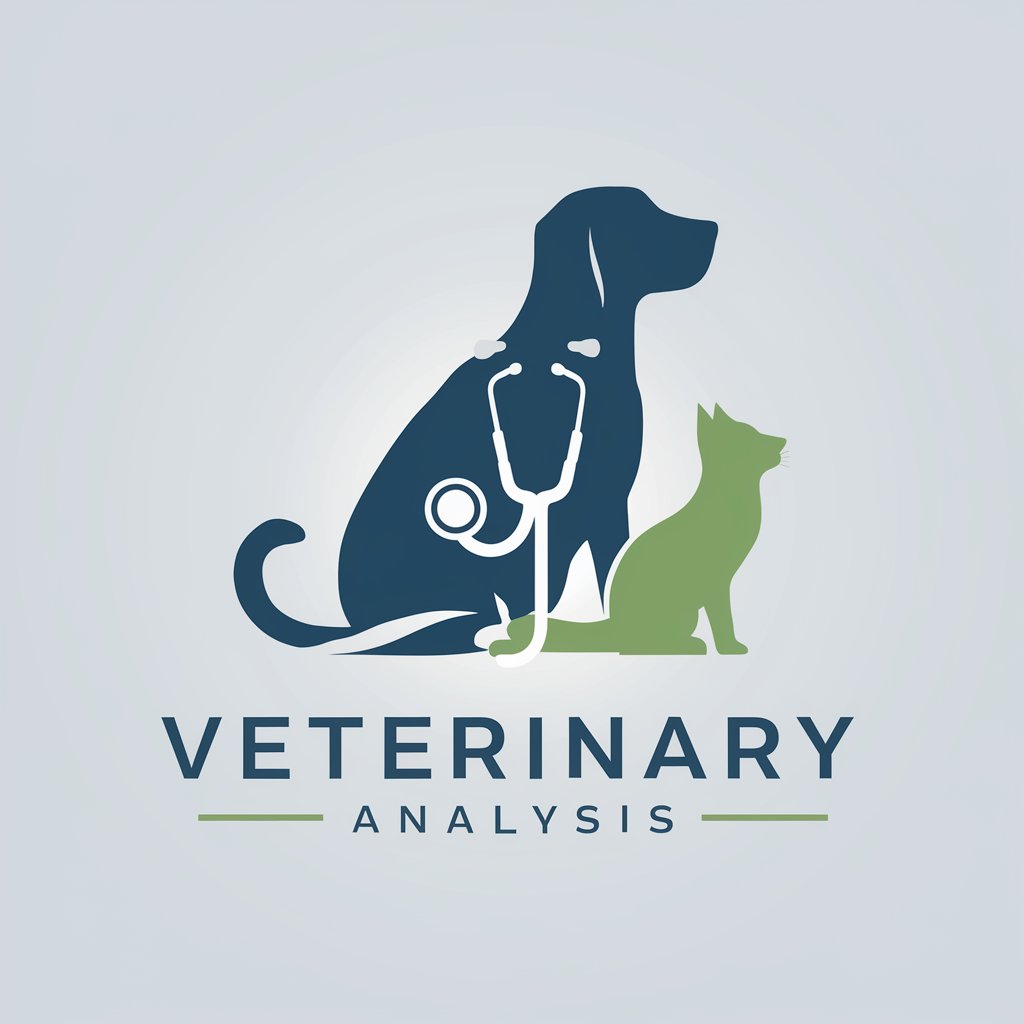Veterinary Analysis - AI-Powered Veterinary Insights

Welcome! I'm here to provide veterinary medication information.
Empowering Veterinary Decisions with AI
Describe the common medications used for treating chronic kidney disease in felines.
List potential treatments for canine skin allergies and their indications.
Provide an overview of medications for managing epilepsy in dogs.
Explain the use of antibiotics in treating bacterial infections in small animals.
Get Embed Code
Introduction to Veterinary Analysis
Veterinary Analysis is a specialized tool designed to assist in the field of veterinary medicine by synthesizing and providing general information on current medications for various animal pathologies. Its main purpose is to support veterinary professionals, students, and pet owners by offering insights into suitable pharmaceutical options based on specific diagnoses for small animals. This tool is not meant to replace professional veterinary advice but rather to augment it by offering a database of medical treatments and their implications. For example, if a veterinarian diagnoses a cat with chronic renal failure, Veterinary Analysis can provide detailed information about potential medications, considering the animal's species, age, and condition. Powered by ChatGPT-4o。

Main Functions of Veterinary Analysis
Medication Suggestions Based on Diagnosis
Example
For a dog diagnosed with Canine Parvovirus, Veterinary Analysis would suggest appropriate antiviral treatments, supportive care options, and hydration therapies, considering the dog’s size, age, and specific symptoms.
Scenario
A veterinary professional inputs a diagnosis into the tool to receive a list of suitable medications, helping streamline the treatment process.
Disease and Medication Information
Example
Provides comprehensive details on medications like Metronidazole, including its indications, contraindications, dosage, and side effects for different species.
Scenario
A veterinary student uses Veterinary Analysis to study the common medications prescribed for gastrointestinal issues in reptiles.
Customized Treatment Plans
Example
Generates tailored treatment suggestions for a rabbit with dental disease, including antibiotics, pain management, and dietary recommendations.
Scenario
A rabbit owner seeks advice on how to manage their pet’s condition and uses the tool to understand the potential treatments and care needed.
Ideal Users of Veterinary Analysis Services
Veterinary Professionals
Veterinarians, veterinary technicians, and other animal health practitioners who require up-to-date information on animal medications and treatments to make informed decisions in their practice.
Veterinary Students
Students pursuing veterinary medicine who need access to a broad range of pharmaceutical information for educational and study purposes, helping them prepare for real-world clinical scenarios.
Pet Owners
Informed pet owners looking to understand more about the medications and treatments prescribed to their animals, aiding in compliance and proper care, although they should always seek advice from a professional veterinarian.

How to Use Veterinary Analysis
1
Start by visiting yeschat.ai for a seamless trial experience, no login or ChatGPT Plus subscription required.
2
Provide a detailed animal diagnostic report, including species, age, weight, observed symptoms, test results, and any other relevant information.
3
Specify the diagnosis or ask about potential medications based on the provided report.
4
Review the list of medications generated by Veterinary Analysis, including detailed information on administration, dosages, and precautions.
5
Utilize the tool's output for academic research, educational purposes, or to inform discussions with veterinary professionals.
Try other advanced and practical GPTs
BrotherBox
Empowering Creativity with AI

Thumbnail Wizard
Craft Your Visual Story, AI-Enhanced

Mauw
Engage in AI-powered cat conversations

Detoxify
Clean your text with AI power!

MakeMeGoChat
Unleash Potential with AI

PROCESSWORLD
Empowering Decisions with AI Insight

Tatouage Chatbot
Envisioning your ink, powered by AI.

Autism Insight
Empowerment through AI-Powered Autism Understanding

Topic Insight
Unlock insights with AI-driven analysis.

Wai Wai
Enhance your productivity with AI

LifeCoach.AI
Empowering insights with AI coaching

Jean-Mi | Subventions
Empowering innovation with AI-driven funding support.

Frequently Asked Questions about Veterinary Analysis
What is Veterinary Analysis?
Veterinary Analysis is a specialized AI tool designed to provide comprehensive information on medications for various animal diseases, based on detailed diagnostic reports.
Can Veterinary Analysis prescribe medications?
No, Veterinary Analysis does not prescribe medications. It provides information on potential medications for a given diagnosis, to support educational and research purposes.
How accurate is the information provided by Veterinary Analysis?
The information is derived from up-to-date veterinary pharmacology sources. However, it should be used as a guideline and not as a substitute for professional veterinary advice.
Is Veterinary Analysis suitable for all animal species?
Yes, the tool is designed to provide medication information for a wide range of animals, including pets, livestock, and exotic species.
How can I ensure the best results from Veterinary Analysis?
For optimal results, provide detailed and accurate diagnostic information. The more specific you are, the more tailored the medication information will be.
